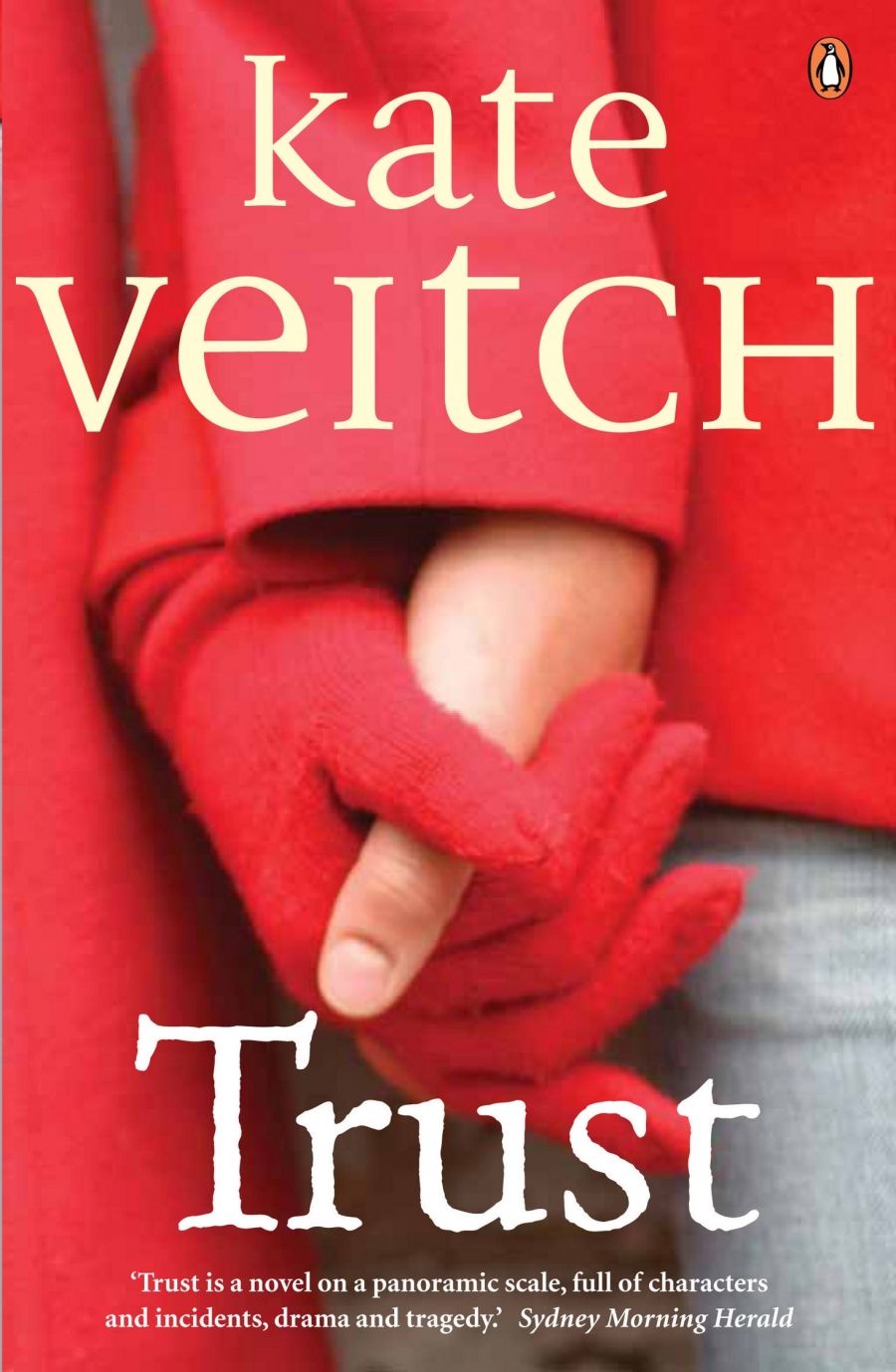
- Free Article: No
- Contents Category: Fiction
- Review Article: Yes
- Article Title: Quiet liberation
- Online Only: No
- Custom Highlight Text:
Kate Veitch’s first novel, Listen (2006), was a richly detailed examination of family and the repercussions of a single, fateful decision. Her second, Trust, continues her exploration of these themes and also focuses on feminism, forgiveness, religion, sexuality and the importance of recognising the truth about one’s own character and motivations. Divided into two sections (‘Before’ and ‘After’), the new novel follows the lives of Susanna Greenfield and her family in the lead up to, and aftermath of, an unexpected and tragic event.
- Book 1 Title: Trust
- Book 1 Biblio: Viking, $32.95 pb, 359 pp
- Book 1 Cover Small (400 x 600):

Veitch generally excels at capturing the essence of familial relationships, and bringing their affectionate, tense, frustrated, loving, humorous and sometimes cataclysmic interactions vividly to life. She skilfully evokes the satisfaction of triumphing over school bullies, the awkward excitement of first love and sexual experiences, the importance of family traditions and the barely rational demands of grief.
Although the depictions of some protagonists, particularly Gerry, verge on caricature, and there are some weak sections, Veitch has a flair for creating younger characters with strong, convincing voices. Seb, Stella-Jean, Finn and their friends are a delight. Veitch handles their relationships with sensitivity, humour and tenderness. Finn is particularly appealing; his justified anxiety about Gabriel, the sinister and charismatic musical director of the Faith Rise church, who moves into Angie and Finn’s house as a ‘sharer’, adds a thriller-like dimension to the narrative.
Trust is set in contemporary Melbourne, and Veitch carefully weaves well-known locations into the narrative, along with references to a diverse range of subjects, including the Victorian drought, the 2009 Australian Open Men’s final, Sorry Day, the Black Saturday bushfires and the sinking of the SIEV X. Susanna’s developing artwork allows Veitch to explore a number of events: some notorious, others less so; while, for Susanna, the pieces offer a chance to achieve the creative validation she has yearned for. Her revitalised artistic efforts force Susanna to confront and embrace her own reality; the sections where she sketches her naked reflection are particularly well-handled, if a little predictable.
There is a strong connection between Trust and Listen. This relationship is highlighted in an odd digression near the beginning of Trust. Susanna and her mother regularly attend a book group together. Conveniently, the book that the group has chosen to discuss is Veitch’s own début effort:
On the long wooden table amid the water and wine glasses, the nibbles and dips, sat copies of that month’s book, Without A Backward Glance [Listen’s US title], a novel about a troubled family where the mother had walked out on her husband and four young children in 1967 and not been seen again for forty years.
What follows is a fairly didactic and forced discussion in which the various members of the book group debate the book’s merits:
‘Well, it was certainly easy to read,’ Susanna offered. ‘I gobbled it down in a couple of nights.’
‘Same here,’ said the youngest of their group, Amy, who was doing an MA in Australian Literature. ‘A page-turner. Pretty lightweight.’
‘But does “easy to read” necessarily mean lightweight?’ Denise asked with a smile. ‘I think this novel deals with some quite heavy issues.’
If Veitch wanted to respond to the reception of her first book, it would have been more productive to do so directly rather than by including a book group discussion of it in her second. Cleverly breaking down the literary fourth wall can be enriching, but this simply feels distracting and self-indulgent.
Nonetheless, this section does allow Veitch to position the two books as companions. Both explore the impact on the families of two women who make very different decisions about their own creative self-fulfilment in the early years after their marriages and the births of their children. In Listen, Rosemary flees the claustrophobia of her life in 1960s Australia to pursue her dreams of being a fashion designer. In Trust, Susanna follows the urgings and perceived wants of others, gives up her workroom and subjugates her needs to those of her family. In doing so, she takes the path advocated by her mother, who believes that ‘Duty trumps pleasure, especially when it comes to family’. There are other elements and character types in Trust that will be familiar to those who have read Listen, but at the heart of this warm-hearted, if sometimes uneven, novel is the question of what it means to be a ‘good’ woman and the cost of attempting to live up to this ideal.
Trust, an engaging portrayal of ‘ordinary life ... in all its quivering complexity’, concludes with a sense of quiet liberation and cautious optimism, and largely delivers on the promise of Veitch’s first novel.


Comments powered by CComment